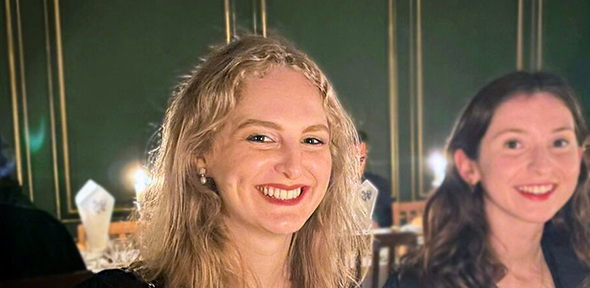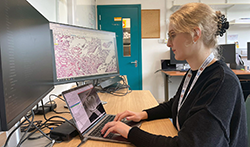
Submitted by Irena Rao on Thu, 18/04/2024 - 19:21
Hannah Clayton is a first-year PhD student in the Crispin Group at the Early Cancer Institute. She is one of the 2023 cohort of Harding Distinguished Postgraduate Scholars, a programme which has given her the opportunity to carry out groundbreaking work in ovarian cancer, in a multi-disciplinary and collaborative environment.
Hannah was recently interviewed by the University's Development and Alumni Relations office. The full interview can be read on the website:
Harding Scholar Hannah Clayton: Crossing disciplines and continents to pursue groundbreaking cancer research
Hannah completed her undergraduate degree in Mathematics and Physics at the University of Cape Town in South Africa, where she grew up. She then came to Cambridge for a Master of Advanced Study in Physics in 2021-22, where she was introduced to her current work on predictive modelling for cancer while carrying out a research project as part of her degree. She says "I had done quite a lot of heavy theoretical physics work along with some research during my undergraduate degree, and I certainly found that intellectually stimulating. But I had always been interested in doing something with a medical spin to it."
The project, overseen by Hannah's current PhD supervisor, Dr Mireia Crispin, was focussed on radiology data and trying to predict treatment response for ovarian cancer based on features of cysts on CT scans. It clearly sparked an interest in using data and machine learning to improve healthcare and outcomes for patients; after a brief stint back in South Africa working as an equity analyst, Hannah returned to Cambridge to start her PhD in Oncology in October 2023.
Hannah’s research topic is 'Machine learning to understand the radiogenomics of resistance in ovarian cancer.' It focuses on the large-scale integration of different data 'modalities', including radiology, to inform clinical decision-making and patient classification.
Hannah explains: "These data types are on very different scales. For example, with radiology, for ovarian cancer you're taking a scan of the whole pelvic region. But when we talk about a biopsy or histopathology sample, it can be just a few cells. Or we look at a tumour that's been removed after surgery and that's bigger than a few cells but much smaller than the whole pelvis. We want to be able to align and link all this data in the correct way to create a comprehensive picture of the disease."
In our group we have physicists, mathematicians, engineers and clinicians all together in the same room and the same meetings, and we're all working towards one goal — just from different approaches. And of course, there are the great facilities and the very bright minds that Cambridge always attracts. That's what gives Cambridge the edge.Hannah Clayton
Hannah was thrilled to receive a Harding Distinguished Postgraduate Scholarship. Each year they provide outstanding PhD students with life-changing opportunities to research and study at the University of Cambridge. These fully funded Scholarships are available to the most talented students in any discipline, from all parts of the UK and the world.
The full interview with Hannah can be read here: www.philanthropy.cam.ac.uk/impact-of-giving/impact-stories/harding-scholar-hannah-clayton-ovarian-cancer-research

